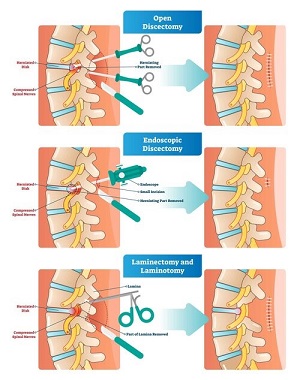
Spinal cord and nerve decompression surgery is designed to relieve pressure on the spinal cords and nerve roots. This pressure, or stenosis, on the nerves can be the cause of a variety of symptoms such as chronic pain, numbness and tingling, weakness, unsteadiness, and in some rare cases even neurological deficits. When that pressure is relieved, patients can experience relief from those symptoms.
Spinal decompression surgeries are often indicated for spinal stenosis. Spinal stenosis is the narrowing of the spinal cavity, usually caused by thickening ligaments and degeneration of the facet joints. This can result in the narrowing of the spinal cavity applying pressure on your spine or nerve roots. The goal of spinal decompression surgery is to relieve this pressure and there are several procedures available to achieve this goal. Some of the most common spinal decompression procedures are:
Laminectomy: A laminectomy involves the removal of the lamina, a part of the facet joints, and the ligament. By removing the lamina and ligament, pressure on the spinal canal is often relieved.
Foraminotomy: A foraminotomy is the widening of the foramen, the hollow vessel through which the nerves leave the spinal canal. This relieves pressure on the nerve roots.
Laminoplasty: In a laminoplasty, the lamina is reshaped to relieve pressure on the spinal cord. This procedure is often performed in cases requiring cervical spinal decompression.
Discectomy: The removal of a portion of a bulging/degenerative disc to relieve pressure on the nerves.
Why Perform Spinal Cord or Nerve Decompression Surgery?
You may be a candidate for spinal cord or nerve decompression surgery if you suffer from symptoms of spinal stenosis. The symptoms of spinal stenosis include:
- Chronic pain
- Numbness
- Tingling
- Weakness
- Unsteadiness
Spinal decompression surgery can often relieve those symptoms, and delivering relief after years of suffering.
What Are the Risks of Spinal Cord and Nerve Decompression Surgery?
While spinal decompression surgery can be beneficial, no surgery is entirely without risks. Many of the complications can be mitigated through proper preparation and postoperative care. The main risks of spinal decompression surgery are bleeding, infections, blood clots, nerve injury, and spinal fluid leak.

